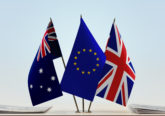There is no shortage of lessons to be learned from Brexit and its fallout – for politicians, businesses and the public alike. For strategists, analysts and advisors, these past few weeks have provided a host of examples of both good and bad practice. Surveying recent events, four take-aways stand out:
1) Forecast, don’t predict
No one predicted this. Nor did the polls or the betting markets. Even the leaders of the Leave campaign did not predict Brexit. More than this, though, no one predicted that within weeks of a vote all of the Leave campaign’s victorious leaders would have resigned from the field and a new Prime Minister (who supported Remain, however quietly) would be installed in Downing Street.
Polling is less accurate than it used to be. This was as evident the morning after the referendum as it was the morning after the Conservatives’ surprise majority victory in the 2015 election. Due to changes in how we use technology, pollsters are less able to gather reliable data.[1] Pollsters used to call people at home to ask them how they’d vote. Today, far fewer people have or use landlines at home and those who do know better than to pick up a call from an unknown number. Polling will eventually adapt to this new reality, but until it does we need to treat polling data with greater caution than we presently do, particularly when the predicted outcome is within the margin of error.
This, however, is only a small part of a bigger problem that we face with prediction today. The tempo of events has sped up so much that new facts and new contexts are already emerging as people are only just catching up with the latest developments. It was only a matter of days between Nigel Farage winning the referendum to him resigning; a matter of hours between the results being announced and David Cameron resigning; and a matter of minutes between Boris Johnson being about to launch his campaign for the Conservative leadership as the presumptive frontrunner to falling victim to rapidly shifting allegiances in his party. Even if someone had predicted a victory for Leave, no one could have predicted the fallout. We cannot predict with any accuracy a new set of facts that follows another because there are too many variables in play.
Success in such an environment involves neither dogmatically trying to predict events nor throwing our hands up, giving a shrug and resigning ourselves. The lesson to be learned is that successful analysis involves forecasting, not prediction.[2] Forecasting involves identifying relevant factors and players, being mindful of the unknown ‘wildcards’ and unforeseen ‘black swans’, assessing the likely impact of any particular factor on one another and being able to quickly update assessments as events develop.[3] Forecasting is not reading some data and drawing a conclusion; rather, it’s a continual process of constant re-evaluation in light of new facts.
Those who base their work on forecasting, instead of prediction, are far more adept at dealing with uncertainty and risk because these twin realities of contemporary politics are central to the very concept of forecasting; whereas prediction dogmatically attempts to overcome them.
2) Good leadership is prepared leadership
We may not be able to predict, but we can prepare. As above, because the tempo of events is so fast, we need to be prepared for what might come next even before we know what will come next. We are no longer afforded the luxury of time to plan a response entirely after an event. Of course, preparing for every eventuality is impossible and misguided. Forecasting allows us the ability to tell us what the likely outcomes are to be and in turn anticipate the likely best moves to make in response.
As the pound went into free-fall the morning after the referendum the Governor of the Bank of England, Mark Carney, tried to halt a major market selloff. He was calm and collected and detailed exactly what measures would be taken to attempt to stabilise the economy. The outcome of the referendum was not what he wanted but he was nonetheless prepared for it. Meanwhile, unprepared for their win, the Leave campaign were nowhere to be seen in the crucial hours after the result, serving only to exacerbate uncertainty. In the days that followed it became evident that there was no plan in place for what to do in the event of a win, an error that contributed to both Michael Gove’s and Boris Johnston’s credibility being severely undermined and confidence in them being eroded. Predicting that they would not win, the Leave campaign failed to prepare for the forecasted possibility that they would.[4]
Success in any crisis, be it political, economic, or – as it is in this case – a mix of the two, relies on the ability to respond quickly. As Bear Gryls could attest, survival depends on preparation and what’s true in the wild is true in political turmoil. And that’s why, as any speechwriter knows, a good leader will always have (at least) two speeches in his/her proverbial pocket, as both David Cameron and Mark Carney almost certainly did the morning after the vote. Successfully managing uncertainty involves neither predicting an outcome and hoping you’re right or doing nothing with a ‘wait and see’ attitude; rather, it involves laying the groundwork in advance for all likely eventualities.
3) Reputation matters
While the focus in a crisis is on the present and the immediate future, the foundations for weathering the storm and emerging from it successfully are laid well in advance.[5] Moreover, this groundwork can easily be undone by mismanagement in the thick of it.
Michael Gove, in turning on Boris Johnson, undid in single move the preparatory work he had built over his political career. He went from being a respected, senior party member to being a back-stabbing opportunist in a single morning. While he rightly spotted an exploitable opportunity, he went for it neglecting the fatal effect that doing so would have on his reputation. Gove’s error was failing to see that in turning on Boris he would undercut the image that he had crafted for himself and make himself appear less like the trusted hand that the country needed.
Theresa May, on the other hand, held fast to her public persona throughout, maintaining the image of a respected, experienced senior minister while those around her clamoured for the keys to Number 10. As the dust began to settle she faced Andrea Leadsom who had largely failed to invest in her reputation, lacked experience and faced questions over both her credibility and her judgement. In holding fast to her reputation, Theresa May won the premiership.
There are two specific lessons to be found here. First, reputation matters and managing that reputation is key for success, especially amidst uncertainty. Second, if you make a move that runs counter to the identity that you’ve constructed for yourself, no matter how advantageous that move may be, it’s ultimately counterproductive as it calls your character into question – undesirable in a leader (and particularly in the midst of uncertainty).
4) Simple, resonant messages win
The Leave campaign presented voters with a simple choice: in or out. Whatever particular issue motivated a voter – be it immigration, the economy, sovereignty, or security – it easily fit in Leave’s binary framing. Remain, on the other hand, largely offered voters messages with complexity and nuance, forcing them win voters’ support based on the intricacies of pooled sovereignty and transfer payments. Leave’s messages were simple and intuitive. Remain’s too often were not.[6]
Moreover, the issues that the Leave campaign focused on had emotional resonance with voters, regardless of the veracity of their claims about immigration or the economy. Leave offered change while Remain offered the status quo (or at least an approximation thereof). ‘Change’ has emotional resonance, particularly in a context of economic stagnation and political exclusion.[7]
Leave’s messages also stuck with voters because of their simplicity.[8] Leave’s now infamous ‘battle bus’ is illustrative. It didn’t matter that its claims weren’t true. It was effective because it was a simple message (so simple it could be slapped on the side of a bus). It at once highlighted two emotive issues (money being sent to Europe and money not being spent on the NHS), and it simply ‘felt’ right. The closest the Remain campaign got to an equivalent message was Gordon Brown’s appeal that the European project provided peace and security that prevented a return to the horrors of world war. While it had emotive resonance, the topic was too far removed from the more immediate concerns of Leave supporters. It ultimately failed to have enough traction.
The take-away is that truth still matters in campaigns. It absolutely does. Nigel Farage’s admission that the bus was a ‘mistake’ and Boris Johnson’s post-referendum column that heavily nuanced or backtracked on most of the Leave campaign’s promises only served to further damage their credibility. But there are two necessary dimensions to achieving effective strategic communications: crafting emotive, resonant messages that speak to the immediate concerns of voters and – just as necessary – positioning your campaign so as to have ownership of the simple narrative.
[1] Barone, Michael, ‘Why Political Polls Are So Often Wrong’, The Wall Street Journal, 11 November, 2015. http://www.nytimes.com/2015/06/21/opinion/sunday/whats-the-matter-with-polling.html?_r=0 ; Zukin, Cliff, ‘What’s the Matter With Polling?’, The New York Times, 20 June, 2015. http://www.nytimes.com/2015/06/21/opinion/sunday/whats-the-matter-with-polling.html?_r=0
[2] C.f. Tetlock, Philip and Dan Gardner, Superforecasting: The Art and Science of Prediction, 2015.
[3] Taleb, Nassim Nicholas, The Black Swan, 2007.
[4] Likewise, the Government was caught with no contingency plan.
[5] C.f. Boin, A. et al. The Politics of Crisis Management, 2006.
[6] C.f. Sametz Blackstone Associates, ‘Articulate to Resonate: Crafting the Communications Messages that Matter’, http://sametz.com/authored-articles/articulate-to-resonate-crafting-and-communicating-messages-that-matter/
[7] C.f. Chaffin, Joshua, ‘EU Referrendum: A Contest Between Economics and Emotion’, The Financial Times, 23 June, 2016. http://www.ft.com/cms/s/0/52a2fc22-388f-11e6-9a05-82a9b15a8ee7.html
[8] C.f. Cave, Andrew, ‘How Europe Lost: Five Ways The ‘Remain’ Campaign Failed in Britain’s European Union Referrendum’, Forbes, 27 June, 2016. http://www.forbes.com/sites/andrewcave/2016/06/27/how-europe-was-lost-five-ways-the-remain-campaign-failed-in-britains-european-union-referendum/#79b34fac4f47




